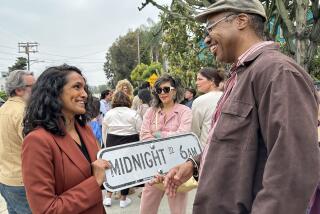A Coinage Is About to Pay Dividends
- Share via
Wondering whether a taxpayer living outside marriage with a person of the opposite sex could claim that person as a dependent for income tax purposes, Neal Walker of Apple Valley did the sensible thing: He wrote a letter to the state Franchise Tax Board asking that very question.
In his letter, Walker referred to “the person of opposite sex” as a POSSLQ, a word that I have often championed and that has gained some currency, though it is not yet universally accepted.
As I have noted, the word POSSLQ is an acronym derived from a descriptive phrase found in the 1980 U.S. Census form: Persons of Opposite Sex Sharing Living Quarters.
This happy phrase occurred at a time when “living together” before or without marriage had become a widespread and popularly accepted life style. However, the language provided no word for the person with whom one shared such an arrangement. Even parents who approved or accepted such a relationship were embarrassed when it came to giving their son’s or daughter’s live-in lover a name. Son-in-law or daughter-in-law, of course, would not do, since the relationship was extralegal. Lover was too explicit. I once suggested son-in-love, but it never caught on.
It was about then that William Rukeyser of Money magazine discovered that happy phrase in the census form and Charles Osgood introduced the acronym to his CBS radio audience, exclaiming, “The very word we’ve been looking for!”
Though it is an acronym, I think the word is more likely to gain wide acceptance if it is rendered in lower case as posslq , and pronounced poss’l-cue or perhaps pozz’l-cue.
Of course, it may be argued that “a person of opposite sex” may very well be one’s spouse; but that was not the intent of the census bureau’s phrase. In practice the word should be taken as meaning unmarried persons of opposite sex only, since there is such a need for it.
In its answer, the tax board notes that the California Revenue and Taxation Code (which follows the federal code) states that:
“A dependent may be an individual (other than the spouse) who for the taxable year has as his or her principal place of abode the home of the taxpayer and is a member of the taxpayer’s household. . . . However, an individual is not a member of the taxpayer’s household if at any time during the taxable year of the taxpayer the relationship between such individual and the taxpayer is in violation of local law. . . . “
Under California criminal law, the board says, relationships that are in violation of the local law are (1) an illicit relationship with a child (2) an illicit relationship with a nonconsenting adult (3) an incestuous relationship, and (4) an illicit relationship, such as bigamy.”
If none of these illicit factors exist, the board implies, it is not against the law in California for two consenting adults to cohabit. Note that the board does not say consenting adults “of opposite sex,” so the rule evidently includes pssslqs , or persons of the same sex sharing living quarters.
(While that relationship is commonplace, and needs a name as much as persons of opposite sex sharing living quarters do, I do not think pssslq will work. For one thing, it is unpronounceable. Persons of the same sex sharing living quarters will have to find another word.)
The board says: “Therefore, the taxpayer would be allowed to claim the dependent exemption credit for his live-in friend assuming all the other requirements of the statutes have been fulfilled and the relationship is not in violation of local law.”
Of course, for many years the law has not prosecuted unmarried adults for living in cohabitation, although I believe that in some jurisdictions statutes prohibiting such a relationship remain on the books.
Though the tax board did not specifically use the word posslq in its letter, it certainly defined it and bestowed its official recognition on the relationship it represents. If all the word needed was legal validity, I think it has that now.
I do not want to steal the play from Rukeyser and Osgood, but if the word succeeds I’d like to get credit for an assist. It may be my only important contribution to the language.
More to Read
Inside the business of entertainment
The Wide Shot brings you news, analysis and insights on everything from streaming wars to production — and what it all means for the future.
You may occasionally receive promotional content from the Los Angeles Times.









